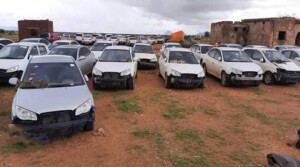Transport tariffs increase dramatically whilst Sudan’s economy continues to suffer
Transportation tariffs in Khartoum witnessed a significant increase yesterday. Witnesses said that prices increased between 40 and 50 per cent. People condemned and rejected the increase in times of economic and political crisis.
 Khartoum bus terminal (RD file photo)
Khartoum bus terminal (RD file photo)
Transportation tariffs in Khartoum witnessed a significant increase yesterday. Witnesses said that prices increased between 40 and 50 per cent. People condemned and rejected the increase in times of economic and political crisis.
Listeners told Radio Dabanga that the increases mean more suffering for the people who already struggle in the current crisis and difficult economic conditions.
Witnesses explained that they saw plenty of grumbling complaints and discontent among commuters, including verbal altercations between passengers and drivers of buses and other commercial vehicles.
The sources said that the streets of Khartoum looked calm on Monday, as the number of vehicles on the roads was clearly less than usual.
On Saturday, the Ministry of Oil announced that the petrol prices were raised by SDG90* per litre, now costing SDG760 per litre. The price for a litre of diesel increased by SDG108 to SDG748.
“The [increased] fuel prices follow the review that the ministry has conducted with the free and private import companies in light of the changes that occur in the global fuel market,” the ministry stated.
Sudan already witnessed several increases in fuel prices last year as part of a process of gradual removal of fuel subsidies. The Ministry now aims to follow international prices.
Inflation rates in Sudan reached record levels following the October 2021 coup d’état, but they began to decline recently as the annual inflation rate in the country recorded 148.88 per cent in June, compared with 192.21 per cent in May.
The economic situation has continued to deteriorate in Sudan during 2022 as reports indicated that the value of the local currency has decreased 20 times (2,000 per cent) over the past five year.
The military coup that took place in October did not improve the situation. The Sudanese pound devalued further and economic sanctions were imposed whilst promised international aid was suspended.
Military control of Sudan economy further has obstructed democratic transition and international support.
*At the moment, one USD trades for SDG447 according to the Central Bank of Sudan (CBoS). On the parallel forex market in Khartoum, one US dollar traded for SDG570 this morning.











 and then
and then